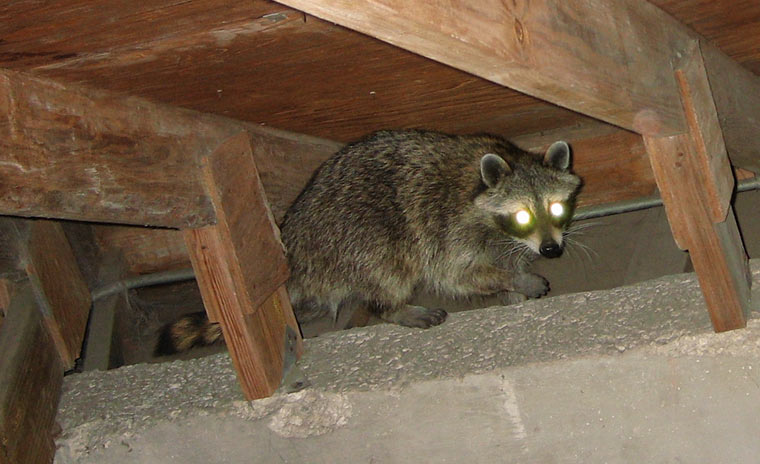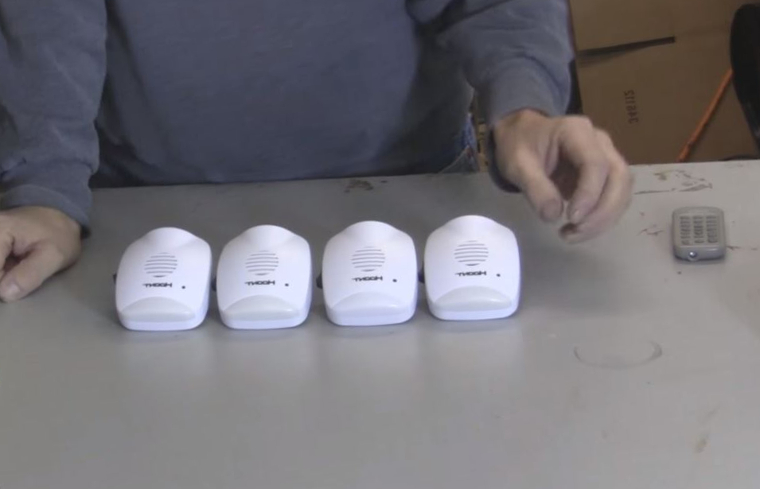-
info@aaanimalcontrol.com
Call us for help in your town
Humane Wildlife Education
What kind of noises and sounds do raccoons make when they live in your house?
Need raccoon removal in your hometown? We service over 500 USA locations! Click here to hire us in your town and check prices - updated for year 2020.
While you want your home to be a location where you can get away from the world, there are many instances where wild animals may find that your house makes the perfect respite for them as well. They love the solitude and peace your house provides just as much as you do, and this may mean that you may find an animal like a raccoon located in your basement or in the attic of your house.

The problem in the situation is that most people are completely unaware that this animal has gain access into their property. Because of the loose board, a hole, or crack somewhere, the raccoon is able to figure out how to get in and create its own residence there. Soon it can be using your insulation, old blankets, clothing, or newspapers to make the ideal nest for itself, creating a large number of health risks for you and your family.
Learn about What to Do With Raccoons in the Chimney
What becomes the biggest problem for most people is that they are completely unaware that the raccoon has gain access into their home. At least they think they are unaware. A lot of people will tell you after they had the opportunity to pick about it for a little bit that they should've known that a raccoon was there because it was making noises that clearly gave itself away. If you are concerned that a raccoon may have gotten into your home, here are the kind of noises and sounds that raccoons make when they live inside your house.
Learn whether or not raccoons can open doors or windows.
The first kind you should be paying attention to is a scratching noise. These animals will try to dig it areas along the wall, floor, or other area in the house that is quite distinguishable to you. You should especially here these kinds of noises if the raccoon is in the attic of your home. It will frequently try to scratch at the wall or at the floor, looking for access ways it can create to get into other areas of your house.
If the animal is in your attic, you should also hear the clicking noise of its paws as it is walking across your ceiling. This should be another noise they should sound out of the ordinary, especially when you are sleeping at night.
Find out: Do raccoons come out in the rain?
Consider that raccoons are nocturnal animals, which means that they are asleep during the day and awake at night. Because of this, the noises that they are making should be easily heard because your house should be quiet for the most part. If you start to hear scratching and clawing noises, then it is likely that you have some kind of animal in your attic, and that may be a raccoon.
One other noise you want to pay attention to is if you have more than one raccoon in your home, it is not uncommon for the two of them to engage in some kind of wrestling match with one another. You should hear the sounds of this scrum going on.
The Pros + Cons of Using High Pitch Sound Machines to Get Rid of Raccoons
Need raccoon removal in your hometown? We service over 500 USA locations! Click here to hire us in your town and check prices- updated for year 2020.
A high pitch sound machine, also known as ultrasonic sound or noise machines, are pieces of equipment that are meant to repel animals, primarily pest animals, from a patch of land or building.

Starting at about $10 for a battery-operated device, the high-pitched sounds are of a much higher frequency than people are meant to hear, but the pests in your building CAN hear the noise. It irritates them, encouraging them to back away from the machine that is making the sound. In theory, by using these devices, you can eliminate all animals from an entire square area, covered by the machine.
The Pros:
> With machines starting at just a few bucks, these aren't going to break the bank, but the more space you want to cover and the more advanced you'd like the machine, the more you can expect to pay out for it. In some cases, high pitch sound machines can run into the hundreds of dollars, especially for systems that include more than one plug-in or device and a signal to your cell phone so that you can monitor the situation.
> In theory, when you use a device that is meant to REPEL animals, such as a high pitch sound machine, you won't need to seal up your home because the animals won't want to come near it. (Con: this is rarely the case. You will ALWAYS need to seal your home and remove all entry points once wild animals/pests have managed to get inside.)
The Cons:
> Of course, as much as these devices are not expensive to buy outright (for the most part), you will need to take into account the cost of continued use. If it require batteries, these will need to be replaced regularly. The more devices you have, the more batteries you will need to buy and replace. If you are using a device that needs to be plugged into the mains, it will add an extra cost to your energy bills. Solar-powered devices are great for outdoor use, but usually come with an increased initial cost — the solar-powered devices are more expensive to buy than the ones that run on batteries or are mains-operated.
> Cheaper devices will usually cover a smaller range than their more expensive counterparts. A $10 plug-in device is only going to cover a few meters, and may not have much effect through a number of walls, etc. If you have a large house, you are going to need to buy multiple devices, perhaps one for every room. If you want to cover outside land, you will need to ensure that you are buying devices that are suitable for outdoor use, and then make sure that the device covers all of the ground you want to protect. Otherwise, you'll need to buy more than one device, yet again.
> Raccoons are both intelligent and determined. You will more than likely find that an annoying noise won't have much of an effect on this animal, especially if your home provides everything it is looking for — food, water, shelter and safety.
> You will have absolutely no control over where that raccoon ends up. If you choose to use these high pitch sound devices for raccoons without using another approach at the same time, the raccoon is free to come back or move to other areas of your home that perhaps may not be covered by the sound. If the device is plugged in downstairs, for example, the animal is more than likely just going to move higher and higher until it is in the attic. With the barriers in the way — floors, ceilings, the structure of a building — the machine's effectiveness will decrease as you get higher, until it has virtually no effect at all. The raccoon MIGHT leave your property, but there's a much greater chance that it will just find another tighter, darker, and more difficult to reach spot, that the sound CAN'T quite reach.
> As soon as you stop using this device, the animal has nothing to be repelled by. You can't expect to have the machine running 24/7 — it would be very costly to remove wild animals and pests in this way. Plus, the plug-in devices are just going to be using up valuable plug socket space. If you are going to rely on repellents to remove raccoons, you must make sure that you have sealed up the building and taken action to remove all attractants from your property. Raccoons return to the same den site time and time again, so although your raccoon might leave after you install the devices, it won't be long before it comes back, especially if the device has been turned off.
> People CAN hear these machines, despite the packaging reporting this to be impossible. If you can hear it, it'll keep you awake at night. You can't turn it off, because nighttime is when raccoons are the most active.
High Pitch Sound Machines for Raccoons: The Conclusion
As you can see, the list of cons far outweighs the list of pros for using high pitch sound machines to get rid of raccoons. We do not recommend that you rely on repellents, although you might find that you do have some success using raccoon or wildlife eviction fluid to eliminate females.
There are plenty of better ways to get rid of these pests from your property. Spending a small fortune on a “miracle” product is, sadly, not the right way.
For more information, you may want to click on one of these guides that I wrote:
How much does raccoon removal cost? - get the lowdown on prices.
How to get rid of raccoons - my main raccoon removal info guide.
Example raccoon trapping photographs - get do-it-yourself ideas.
Raccoon job blog - learn from great examples of raccoon jobs I've done.
Raccoons in the attic - read about what to do.
Raccoon Damage in the Attic: A Bigger Problem Than You Thought
Is It Okay to Poison Raccoons?


















